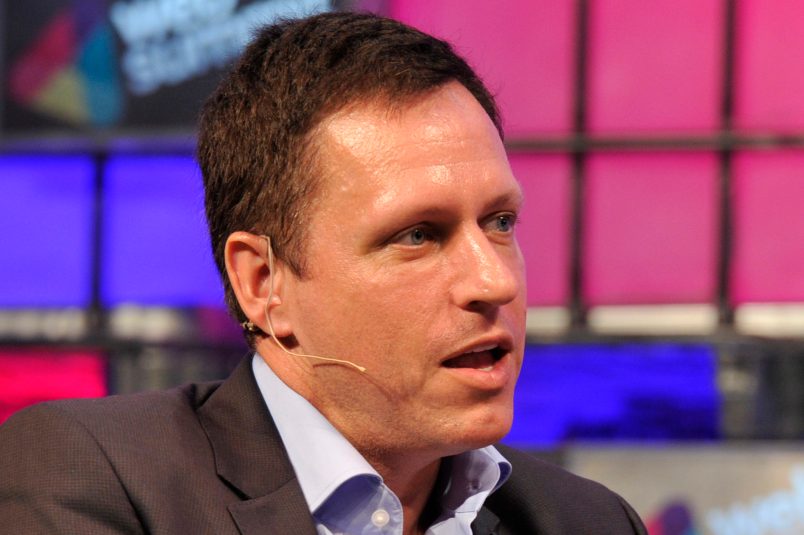Over the long weekend I read Megan McArdle’s take on the Peter Thiel-Gawker story. It was pretty disappointing. The gist of McArdle’s argument boils down to ‘Maybe liberals should understand how big corporations feel when they get sued or lose their free speech.” And “But the ACLU also underwrites lawsuits.” These arguments are either beside the point the first case) or silly (the second). But the amazing thing about McArdle’s effort is that she goes the entire column without mentioning the only really salient issue: Thiel’s need to fund this and other revenge lawsuits secretly.
After I wrote my initial post on this topic, I had a few people write in to say, ‘Well, operating in secret isn’t ideal. But if Thiel had done this publicly, the odds of success probably would have been much lower. Gawker’s lawyers would have had a field day making him the issue.’
I don’t know how much about Theil’s involvement the relevant case law would have allowed Gawker’s lawyers to put before the jury. But this is the whole point. Operating in secret changes everything. And it deprives the jury and the public of a full picture of what is happening. Of course the plaintiffs would have had a harder time.
There’s really nothing we need to discuss about ‘tort reform’ or US libel, slander and defamation law. Journalism has done fine with both for decades. US law makes it very hard to win libel cases, though ‘invasion of privacy’ operates under a different standard. The Thiel case also has little to do with the growing industry of companies that ‘invest’ in lawsuits to reap a portion of the eventual settlement. Such a practice may be susceptible of abuse. But it’s really no different from plaintiff’s attorneys who work on contingency. In both cases the driver of suits isn’t punishing the plaintiff but the likelihood of financial gain. That makes the practice largely self-correcting since only cases with a high likelihood of success (and thus at least in theory fairly meritorious cases) will be funded.
Most people don’t file libel suits because they are very difficult to win, highly expensive and open the plaintiffs up to potentially invasive discovery disclosures. They are that way because of public policy decisions we make as a society. For that reason they tend to be settled. For this reason alone no one would ever go into business funding libel or defamation suits. And remember, despite the staggering judgment which currently stands against Gawker, there’s a very good chance the whole judgment will be thrown out on appeal or at least the judgment dramatically reduced. There is a decent chance Hogan will end up with less money at the end of the day than he might have received had he settled the case.
Having a secret patron willing to fund numerous such cases, spend with limit and focus on the maximal punishment to the publication changes the equation entirely, even if the operative law remains the same. Doing so in secret, again, deprives the public and the jury of a full knowledge of what is happening. Are the plaintiffs going to have a harder time if rather than being presented the case of an injured and sympathetic defendant it is revealed that the defendant is actually the cat’s paw of an embittered billionaire who is funding multiple cases for the purpose for making the publication cease to exist? I think juries would look at such cases quite differently. And for good reason. Of course that is why Thiel acted in secret.
Using the civil courts as an instrument of private vengeance rather than to compensate or punish injuries corrupts the legal system. Doing so in secret deprives the public and the jury of the knowledge which would create some self-correcting mechanism to limit such abuse. It’s as simple as that. Comparing this to lawsuits brought by the ACLU or a conservative public interest law firm is either silly, dishonest or stupid.
Most focus has been on Gawker’s allegedly ‘outing’ Thiel in 2007. If he wanted to he should have sued Gawker then. But the truth is Gawker didn’t really ‘out’ Thiel. And a look at the history makes it seem much more like Thiel’s real animus toward Gawker is based on subsequent reporting/gossiping about his political views like waxing nostalgic for the days before women could vote.
Don’t get me wrong. Gawker has done plenty of unconscionable things: highest on the list was the orchestrated gotcha against David Geithner, brother of former Treasury Secretary Timothy Geithner, which Gawker’s leadership itself found itself unable to justify and took down. As I wrote at the time, “I genuinely do not grasp what even the notional news value or relevance of this article was” and was “bewildered that apparently the entire editorial staff thinks this was a legitimate story and that it was a mistake to withdraw it.”
But that doesn’t change the nature of what Thiel did. The questionable claim of ‘outing’ gives some patina of righteousness to Thiel’s cause. But a fuller view makes it look much more like Thiel is someone who doesn’t like being criticized for things the public really does have reason to know and uses the outsized power of his gargantuan wealth for private vengeance. There may presently be no legal recourse for Thiel’s actions; but public opprobrium is entirely justified.






